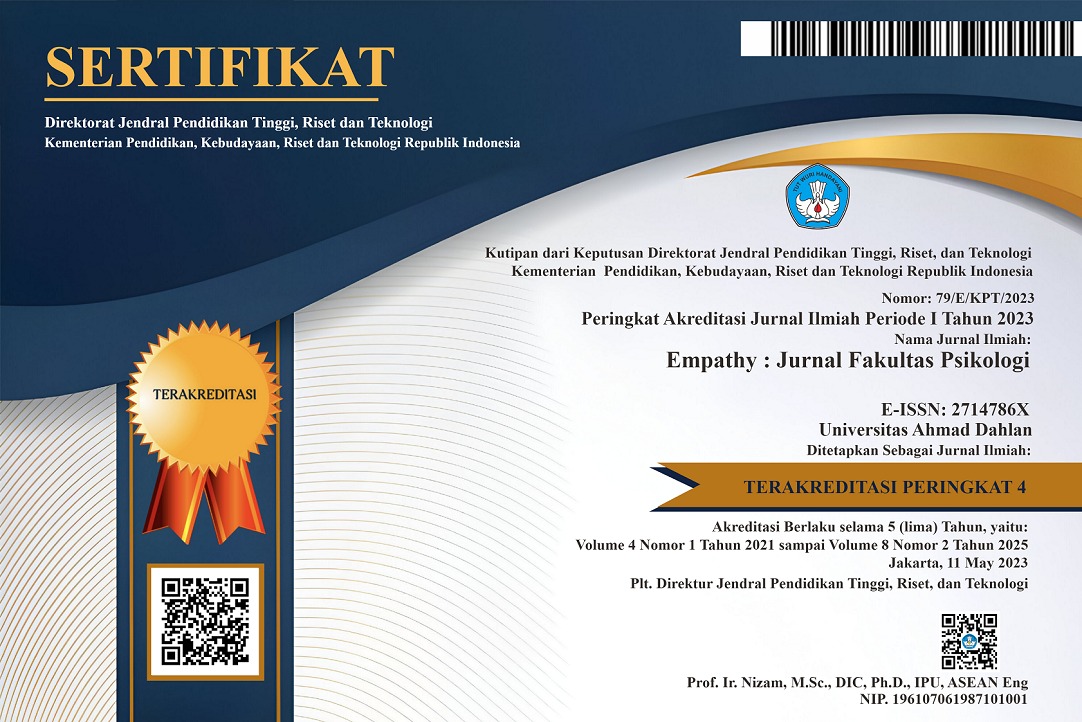Parenting patterns of Vocational High School Students: A case study at Setia Bhakti Vocational High School in Tangerang City
DOI:
https://doi.org/10.12928/empathy.v6i2.26052Keywords:
Parenting patterns, StudentsAbstract
This research was motivated by problems regarding parenting, difficulties in directing children to study because they get bored easily, difficulty dividing time between work and helping children when studying and difficulty in dealing with children using gadgets. This research aims to determine the parenting patterns obtained by Setia Bhakti Vocational School students and the impact obtained from parental care. The method used is a qualitative method with a case study approach. The research subjects were students of Setia Bhakti Vocational School, Tangerang City, class XI majoring in accounting who were taking online learning. Based on the data obtained, the pandemic has changed the parenting style provided by parents, where parents are not only involved in helping their children learn at home but also have to provide learning support facilities. Apart from that, working parents also have to divide their time between work and their children's needs during the online learning process. Not only that, parents must also monitor their child's development so that it does not decline and make the learning atmosphere enjoyable.References
Ansori, A., & Sari, A. F. (2020). Inovasi pendidikan di masa pandemi Covid-19. Jurnal Literasi Pendidikan Nusantara, 1(2), 133-148.
Aminullah, A., Ikram, I., Chandra, F., Fitriani, N., Wasna, W., Misna, M., Elihami, E. (2021). Proses pembelajaran selama pandemi covid-19 (Studi pelaksanaan PLP dasar). Journal of Community Empowerment, 3(1), 21-26.
Munir, Z., & Nisa, A. K. (2022). Analisis pola asuh orang tua dalam pembelajaran e-learning pada masa pandemi covid-19. Jurnal Keperawatan Indonesia, 10(1). 213-227. https://doi.org/10.33650/jkp.v10i1.3403.
Hurlock, E. B. (2013). Psikologi perkembangan. Penerjemah: Istiwidayanti dan Soedjarwo. Yogyakarta: Erlangga.
Lestari, S. (2013). Psikologi keluarga: penanaman nilai dan penanganan konflik dalam keluarga. Kencana Prenada Media Group.
Afiyanti, Y. (2008). Validitas dan reliabilitas dalam penelitian kualitatif. Jurnal Keperawatan Indonesia, 12(2), 137.141. https://jki.ui.ac.id/index.php/jki/article/ view/212/pdf_151
Azwar, S. (2019). Metode penelitian psikologi. Pustaka Pelajar.
Creswell, J. W. (2018). Research design: qualitative, quantitative and mixed methods approaches. Los Angeles: SAGE.
Lilawati, A. (2021). Peran orang tua dalam mendukung kegiatan pembelajaran di rumah pada masa pandemi. Jurnal Pendidikan Anak Usia Dini, 5(1), 549-558. DOI: 10.31004/obsesi.v5i1.630.
Kumar, A., Nayar, K. R., & Bhat, L. D. (2020). Debate: covid-19 and children in india. Child and Adolescent Mental Health. https://doi.org/10.1111/camh.12398.
Kusmiati. E., Sari. D. Y., & Mutiara, S. (2021). Pola asuh orang tua dalam membentuk disiplin anak di masa pandemi. Jurnal Pendidikan Anak Usia Dini, 4(2), 78-93. DOI: https://doi.org/10.31851/pernik.v4i2.5424
Danauwiyah, N. M & Dimyati. (2022). Kemandirian anak usia dini di masa pandemi covid-19. Jurnal Obsesi: Jurnal Pendidikan Anak Usia Dini, 6(2), 588-600. DOI: 10.31004/obsesi.v6i2.994
Baumrind, D. (1991). The influence of parenting style on adolescent competence and substance use. The Journal of Early Adolescence, 11(1), 56-95. https://doi.org/10.1177/0272431691111004
Yanuar, A. (2012). Jenis-jenis hukuman edukatif untuk anak SD. Diva Press.
Prasetyo, I., & Utami, F. (2021). Pengasuhan keluarga terhadap perkembangan karakter disiplin anak usia dini. Jurnal Pendidikan Anak Usia Dini, 5(2), 1777-1786. DOI: 10.31004/obsesi.v5i2.985
Sibawaih, I., & Rahayu, A. T. (2017). Analisis pola asuh orang tua terhadap gaya belajar siswa di Sekolah Menengah Atas Kharismawita Jakarta Selatan. Research and Development Journal of Education, 3(2), 172-185. http://dx.doi.org/10.30998/rdje.v3i2.2014
Rini, Y. S. (2014). Komunikasi orang tua anak dalam pengambilan keputusan Pendidikan. Jurnal Ilmu Komunikasi, 3(2), 112-122. https://doi.org/10.14710/interaksi.3.2.112-122
Diponegoro, A. M. (2013). Hubungan pola asuh otoritatif, kontrol diri, ketrampilan komunikasi dengan agresivitas siswa. Psikopedagogia Jurnal Bimbingan dan Konseling, 2(2), 101-111. http://dx.doi.org/10.12928/psikopedagogia.v2i2.2578
Juharta, Y. N. F., Tjalla, A., & Hidayat, D. R. (2015). Perbedaan regulasi diri siswa dalam belajar dilihat dari pola asuh authoritative, authoritarian dan permisif. Insight: Jurnal Bimbingan dan Konseling, 4(1), 1-8. https://doi.org/10.21009/INSIGHT.041.18
Ahmad, H., Irfan, A., Z., & Ahlufahmi, D. (2020). Hubungan antara pola asuh orang tua dengan penyesuaian diri siswa. Jurnal Bimbingan dan Konseling, 5(1) 950-966. DOI: https://doi.org/10.33394/realita.v5i1.2899
Muttalib, S. R.(2020). Dampak pola asuh orang tua terhadap perilaku siswa. Jurnal Sosialisasi Pendidikan Sosiologi, 3(2), 104-108.
Benzet, C., & Kazdin, A. E. (2003). Spanking children: the controversies, findings and new directions. Clinical Psychology Review, 23(2), 197-224. https://doi.org/10.1016/S0272-7358(02)00206-4.
Respati, W. S. (2006). Perbedaan konsep diri antara remaja akhir yang mempersepsi pola asuh orang tua authorian, permissive dan authoritative. Jurnal Psikologi, 4(2), 119-138. 10.6084/m9.figshare.9942455.v1.
Papalia, D. E. (2008). Human development: psikologi perkembangan (ed 9th). Kencana.
Sunarty, K. (2016). Hubungan pola asuh orang tua dan kemandirian anak. Journal of EST, 2(3), 152-160. https://doi.org/10.26858/est.v2i3.3214
Downloads
Published
Issue
Section
License
Authors who publish with Empathy: Jurnal Fakultas Psikologi agree to the following terms:
- Authors retain copyright and grant the journal right of first publication with the work simultaneously licensed under a Creative Commons Attribution License (CC BY-SA 4.0) that allows others to share the work with an acknowledgment of the work's authorship and initial publication in this journal.
- Authors are able to enter into separate, additional contractual arrangements for the non-exclusive distribution of the journal's published version of the work (e.g., post it to an institutional repository or publish it in a book), with an acknowledgment of its initial publication in this journal.
- Authors are permitted and encouraged to post their work online (e.g., in institutional repositories or on their website) prior to and during the submission process, as it can lead to productive exchanges, as well as earlier and greater citation of published work.

This work is licensed under a Creative Commons Attribution-ShareAlike 4.0 International License.



